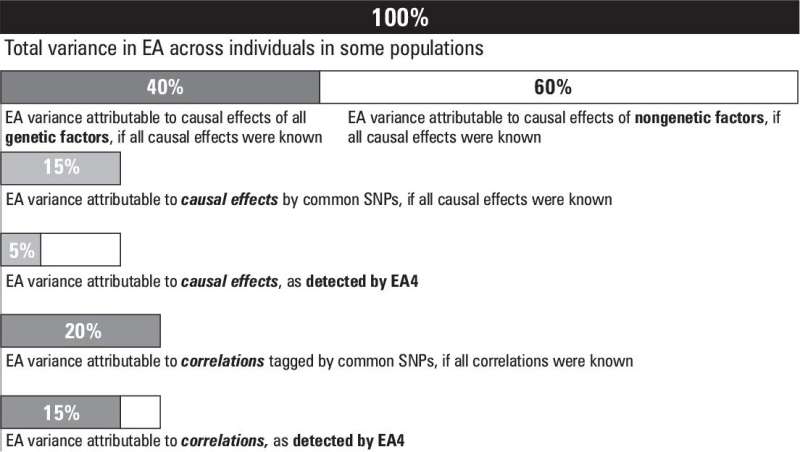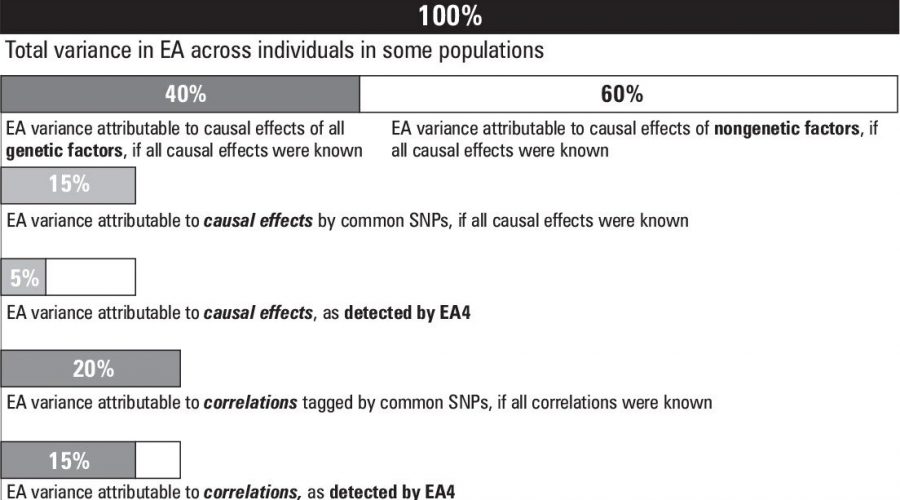New report makes recommendations on controversial genetics research

A new report, “Wrestling with Social and Behavioral Genomics: Risks, Potential Benefits, and Ethical Responsibility,” produced by The Hastings Center, a bioethics institute, provides direction for research and communications in this area of study with both significant social risks and potential benefits. It is accompanied by an article that describes a fledgling effort to integrate community perspectives on the ethics of this research.
Research on genetic variants and human social and behavioral characteristics, or phenotypes, including anxiety, subjective well-being, and educational attainment, is increasing. And there is ongoing concern about its misinterpretation and misuse. The report, developed as part of a three-year project, describes the scientific terrain, and puts the potential benefits and risks of such research in historical and social context.
In light of that analysis, the report offers recommendations for how such research can be done responsibly and concludes that research on sensitive social and behavioral phenotypes that attempts to compare groups defined by race, ethnicity, or genetic ancestry (where genetic ancestry could easily be misunderstood as race or ethnicity) would require a compelling justification to be ethically conducted, funded, or published. This justification requires at least a convincing argument that the study’s design could yield scientifically valid results; some of the report’s authors would also require the study to have a socially favorable risk-benefit profile.
The report is a consensus document from a working group of 19 leading scholars who conduct social and behavioral genomics research and/or think critically about it.
The project was led by Erik Parens, a senior research scholar at The Hastings Center, and Michelle N. Meyer, an associate professor and chair of the Department of Bioethics & Decision Sciences at Geisinger.
Areas of consensus
The group agreed that social and behavioral genomic research has the potential to yield benefits, such as improving social science and clinical trials by using genomic data as control variables; advancing health research; better understanding environmental causes and the limits of genomic influence; and, through these, indirectly improving policies.
The group also agreed that this research has risks, such as increasing stigma and discrimination against individuals; distracting policy-makers from more effective ways of understanding or addressing the phenomena investigated by such research; and promoting the erroneous view that the status quo is inevitable or that environmental interventions are futile.
Two kinds of research were identified as warranting special consideration because they are “more ethically fraught than others.”
- Research of heightened concern involves sensitive characteristics that are: very consequential to social status, part of a stereotype that threatens to reify the biologization of social identities, and/or central to a minoritized group’s identity. Examples include: obesity, substance use disorders, intelligence, educational attainment, income, and criminalized behaviors. “At a minimum, heightened obligations of responsible conduct and communication of this research apply,” the report states.
- Research of greatest concern is any study (1) on sensitive characteristics that (2) would compare groups defined by (a) race, (b) ethnicity, or (c) genetic ancestry, where genetic ancestry could easily be misunderstood as race or ethnicity (“group-comparison research”). “All members of the working group have serious doubts about the scientific validity of group comparison research today regarding [social and behavioral genomic] phenotypes,” the report states. “And we all agree that—considering the social risks of group-comparison research—scientific validity should be an ethical precondition of conducting, funding, or publishing it.”
Area of disagreement
The working group disagreed about whether additional, nonscientific justifications (beyond assurances of responsible conduct and communication) would be needed to justify group-comparison research on sensitive traits if that research is scientifically valid. At present, group comparison research is not scientifically valid.
But, if it proves valid in the future, should group comparison of sensitive phenotypes proceed?
“While some of us believe that researchers should be free to pursue any scientifically valid research, others of us would additionally require a compelling justification of the study’s risk-benefit profile” the report states.
Research recommendations
- Engaging with stakeholders
- Justifying the use and definition of “populations”
- Justifying phenotype definition and measurement
- Conducting studies with adequate power
- Replicating findings in hold-out samples
- Conducting within-family analyses, if possible
- Extending research benefits to diverse people
Communications Recommendations
- Developing a “key-points” box that includes how results should(n’t) be (mis)interpreted or (mis)used
- Further diverting misinterpretations or misuse via FAQs, videos, and careful press releases
- Reporting effect sizes in the abstract and avoiding exaggerating them, including in graphs
- Embedding caveats and context in graphs and tables
- Defining and justifying the use of “populations”
- Moving away from population language that is easily conflated with race or ethnicity
The articles are published in “The Ethical Implications of Social and Behavioral Genomics,” a Hastings Center special report.
More information:
Michelle N. Meyer et al, Wrestling with Social and Behavioral Genomics: Risks, Potential Benefits, and Ethical Responsibility, Hastings Center Report (2023). DOI: 10.1002/hast.1477
Daphne Oluwaseun Martschenko et al, Wrestling with Public Input on an Ethical Analysis of Scientific Research, Hastings Center Report (2023). DOI: 10.1002/hast.1478
Journal information:
Hastings Center Report
Source: Read Full Article
